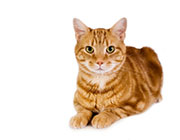
TUESDAY, April 28, 2015 (HealthDay News) — High-pitched sounds may trigger seizures in cats, particularly older felines, a new study says.
Although many veterinarians are unaware of this connection, the louder the sound, the more severe the seizure, British researchers contend.
Cat owners around the world were surveyed by scientists at University College London’s School of Pharmacy, to find out if their pets had seizures or involuntary jerking motions in response to certain sounds.
The researchers found hundreds of people noticed this behavior in their cats. They also found local vets had no answers for why cats reacted this way.
The researchers compiled detailed information on 96 cats, including the type of seizures they had, how long they lasted, and the sound that seemed to trigger the reaction.
The study, published April 27 in the Journal of Feline Medicine and Surgery, found some cats do seemingly suffer from seizures caused by sounds, known as feline audiogenic reflex seizures (FARS).
“We have been overwhelmed by the response to our work. A second study is soon to be published suggesting that levetiracetam [an anticonvulsant sold under the brand name Keppra] is an excellent choice of medication in managing this condition,” study author Mark Lowrie said in a journal news release. “Our experience is that it can completely rid a cat of these sound-induced seizures.”
Some sounds caused non-convulsive seizures, while others triggered brief jerks of a muscle or group of muscles. The researchers also found some sounds caused generalized seizures that involved the entire body and lasted for several minutes, commonly known as tonic-clonic seizures.
These seizures affected both pedigree and non-pedigree cats, although the researchers noted the condition was more common among the Birman breed. Older cats were also more often affected by these seizures. The cats in the study ranged from 10 years to 19 years in age. Since many older cats that develop these seizures have other health issues, it may be overlooked, researchers said.
In most cases, the sounds that triggered these seizures were the crinkling of tin foil, a metal spoon clanging in a ceramic feeding bowl, clinking or tapping of glass, the crinkling of paper or plastic bags, typing on a keyboard or the clicking of a mouse, the clinking of coins or keys, the hammering of a nail and even the clicking of a tongue.
In one instance, the sharp scream of a child triggered this response.
Although it may be difficult for cat owners to avoid making these sounds, cats would experience fewer seizures if they didn’t hear them, the study authors said.
More information
Carnegie Mellon University provides more on seizures in cats.
Copyright © 2026 HealthDay. All rights reserved.

